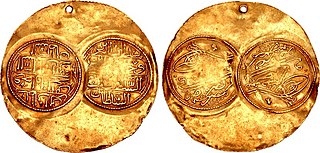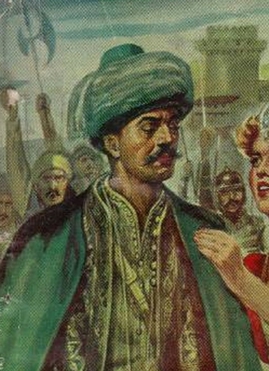Related Research Articles

Ibrahim Bey was an Egyptian Mamluk chieftain and regent of Egypt.

Cezayirli Gazi Hasan Pasha or Hasan Pasha of Algiers, nicknamed Ejder-i Bahrî, was an Ottoman Grand Admiral (1770–90), Grand Vizier (1790), and general in the late 18th century.

Kara Musa Pasha was an Ottoman soldier and statesman of Bosnian origin who was named grand vizier by Sultan Ibrahim I 16 September 1647 after Nevesinli Salih Pasha's execution, holding the office for only five days until 21 September. He also held the office of Kapudan Pasha in 1647. He was trained in Enderûn.
Ebubekir Pasha, also referred to as Koca Bekir Pasha and Abu Bakr Pasha or Abubakr Pasha, was an Ottoman statesman. He served as Kapudan Pasha ; as governor (beylerbey) of the provinces of Egypt, Jeddah, Cyprus, and Bosnia; and as head of the Imperial Mint. In 1740 he became the fourth and last husband of Safiye Sultan daughter of Sultan Mustafa II.

Baltacı Mehmet Pasha was an Ottoman statesman who served as grand vizier of the Ottoman Empire, first from 1704 to 1706 and again in 1710 to 1711, and as Kapudan Pasha in 1704.

Koca Mehmet Ragıp Pasha (1698–1763) was an Ottoman statesman who served as a civil servant before 1744 as the provincial governor of Egypt from 1744 to 1748 and Grand Vizier from 1757 to 1763. He was also known as a poet. His epithet Koca means "great" or "giant" in Turkish.
Semiz Ali Pasha was an Ottoman statesman from the Sanjak of Bosnia who served as Grand Vizier of the Ottoman Empire from 1561 to 1565. He was the beylerbey (governor) of Egypt Eyalet from 1549 to 1553. Semiz Ali Pasha was born in Prača in Bosnia, and replaced Rüstem Pasha as a Grand Vizier. After palace schooling, he discharged high-level functions along the Ottoman Empire. His epithet "Semiz" means "fat" in Turkish.
Yavuz Ali Pasha or Malkoç Ali Pasha was an Ottoman statesman. He belonged to the Malkoçoğlu family and served as the Grand Vizier of the Ottoman Empire from 16 October 1603 to 26 July 1604 replacing Yemişçi Hasan Pasha. He had previously served as the Ottoman governor of Egypt from 1601 to 1603. His installation as Grand Vizier took place on 29 December 1603, over two months after his appointment and a week after the accession of Ahmed I, due to the time it took him to settle affairs in Egypt and travel to Constantinople. He brought with him two years' worth of the province's back taxes.

Gazi Hüseyin Pasha, also known as Deli Hüseyin Pasha or Sarı Hüseyin Pasha or Baltaoğlu Hüseyin Pasha, was an Ottoman military officer and statesman. He was governor of Egypt (1635–1637), Kapudan Pasha in the 1630s, and briefly Grand Vizier in 1656.
Hadım Mehmed Pasha was a Georgian Ottoman statesman. He was Grand Vizier of the Ottoman Empire between 21 September 1622 and 5 February 1623. He also served as the Ottoman governor of Egypt from 1604 to 1605.
Kemankeş Kara Mustafa Pasha was an Ottoman Albanian military officer and statesman who served as Kapudan Pasha and Grand Vizier of the Ottoman Empire.
Bozoklu Mustafa Pasha was an Ottoman statesman who served as grand vizier from 1693 to 1694. His epithet Bozoklu means "from Bozok".

Safranbolulu Izzet Mehmet Pasha was a grand vizier of the Ottoman Empire and served from 1794 to 1798.
Hadım Ali Pasha was an Ottoman statesman who served as the Ottoman governor of Diyarbekir Eyalet, Bosnia Eyalet, and Egypt Eyalet.
Moralı Ibrahim Pasha, also known as Aşçı Ibrahim Pasha or Hacı Ibrahim Pasha or Ibrahim Pasha al-Kapudan, was an Ottoman statesman and grand admiral.
Hatibzade Yahya Pasha was an Ottoman statesman and admiral. He served as Kapudan Pasha of the Ottoman Navy briefly in 1743, as well as serving as the Ottoman governor of Trabzon (1735–36), Ochakiv (1736–37), Bursa (1741), Egypt (1741–43), Rumelia, Aydın (1748), Mosul (1748), Diyarbekir (1748–49), Anatolia (1749–53), Vidin (1753–54), Ioannina (1755), and Trikala (1755).
Hasan Pasha, known by the epithets Uzun Hasan Pasha or Macar Hasan Pasha or Hacı Hasan Pasha or Kazıkçı Hasan Pasha, was an Ottoman statesman and admiral.

Izzet Mehmed Pasha was an Ottoman statesman who served as the Grand Vizier of the Ottoman Empire twice, first from 1774 to 1775, and second from 1781 to 1782.
Keki Abdi Pasha was an Ottoman statesman. He served as the governor of the Sanjak of İçel, Adana Eyalet (1780–81), Diyarbekir Eyalet, Aleppo Eyalet (1784), Rakka Eyalet (1784–85), Sivas Eyalet (1785–86), and Egypt Eyalet.
References
- ↑ Esquer, Gabriel. Reconnaissance des villes, forts et batteries d'Alger par le chef de bataillon Boutin (1808) : suivie des mémoires sur Alger par les consuls de Kercy (1791) et Dubois-Thainville (1809) Collection de Documets inedits sul l'Algerie après 1830.Paris 1927. p. 93.
- 1 2 3 Mehmet Süreyya (1996) [1890], Nuri Akbayar; Seyit A. Kahraman (eds.), Sicill-i Osmanî (in Turkish), Beşiktaş, Istanbul: Türkiye Kültür Bakanlığı and Türkiye Ekonomik ve Toplumsal Tarih Vakfı, p. 294, ISBN 9789753330411